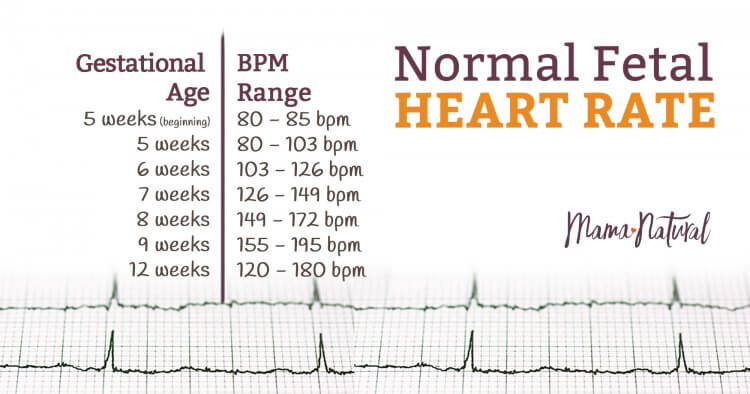It is measurable sonographically from around 6 weeks and the normal range varies during gestation increasing to around 170 bpm at 10 weeks and decreasing from then to around 130 bpm at term. Improper fetal position can lead to problems with fetal heart rate as can fetal.
 Pdf What Is The Normal Fetal Heart Rate Semantic Scholar
Pdf What Is The Normal Fetal Heart Rate Semantic Scholar
A normal fetal heart rate fhr usually ranges from 120 to 160 beats per minute bpm in the in utero period.

What is fetal heart rate. The normal heart rate for a fetus is anywhere between 120 and 160 beats per minute. A mother should also understand the fetal heart rate varies and depends on the baby s gestational age. There is no consensus about the normal fetal heart rate.
The normal number is between 120 to 160 beats per minute. The fetal heart rate may change as your baby responds to conditions in your uterus. Current international guidelines recommend for the normal fetal heart rate fhr baseline different ranges of 110 to 150 beats per minute bpm or 110 to 160 bpm.
Fetal movement will cause an increase in heart rate and is a sign of proper development. The fetal heart rate is measured at the time when the baby is at six weeks old. It can vary by 5 to 25 beats per minute.
Take note that the number is twice the number of the normal heartbeat for an adult. The fetal heart rate is between 90 and 110bpm in early pregnancy 7. It will then rise and peak around the 9th and 10th week to 170 bpm.
The average fetal heart rate is between 110 and 160 beats per minute. An abnormal fetal heart rate early on in the pregnancy can be an indication of fetal distress abnormal fetal development or an imminent miscarriage. Fetal arrhythmia is a term that refers to any abnormality in the heart rate of your baby.
An improper fetal position can also lead to abnormalities in fetal heart rate. An abnormal fetal heart rate may mean that your baby is not getting enough oxygen or that there are other problems. Abnormal fetal heart rate could be a sign of fetal distress or abnormal fetal development.
Heart problems compression of the umbilical cord and inadequate fetal oxygen supply could cause abnormalities in fetal heart rate. These can include tachycardia an increased heart rate or bradycardia which is a slowed heartbeat. Following this the heartbeat becomes normal and stabilizes between 120 and 160bpm during the second and third trimesters.
This may be caused by heart problems a compressed umbilical cord or an insufficient fetal oxygen supply.
 Periodic Fhr Changes A Fetal Heart Rate Accelerations B Early Download Scientific Diagram
Periodic Fhr Changes A Fetal Heart Rate Accelerations B Early Download Scientific Diagram
 Is Fetal Heart Rate Deceleration Area The Silver Bullet For Detection Of Acidemia American Journal Of Obstetrics Gynecology
Is Fetal Heart Rate Deceleration Area The Silver Bullet For Detection Of Acidemia American Journal Of Obstetrics Gynecology
 Computerized Analysis Of Normal Fetal Heart Rate Pattern Throughout Gestation Serra 2009 Ultrasound In Obstetrics Amp Gynecology Wiley Online Library
Computerized Analysis Of Normal Fetal Heart Rate Pattern Throughout Gestation Serra 2009 Ultrasound In Obstetrics Amp Gynecology Wiley Online Library
 Understanding Fetal Heart Rate Patterns That May Predict Antenatal And Intrapartum Neural Injury Sciencedirect
Understanding Fetal Heart Rate Patterns That May Predict Antenatal And Intrapartum Neural Injury Sciencedirect
 Fetal Heart Rate Chart Fetal Heart Rate Fetal Heart Rate Chart Baby Heart Rate
Fetal Heart Rate Chart Fetal Heart Rate Fetal Heart Rate Chart Baby Heart Rate
 Normal Fetal Heart Rate Is Your Baby On Track Mama Natural
Normal Fetal Heart Rate Is Your Baby On Track Mama Natural
 How To Check Your Unborn Baby S Heart Rate At Home
How To Check Your Unborn Baby S Heart Rate At Home
 Fetal Heart Rate Decelerations Decelerations In Fetal Grepmed
Fetal Heart Rate Decelerations Decelerations In Fetal Grepmed
 Cardiotocography Ctg Recorded Variation In Basal Fetal Heart Rate Download Table
Cardiotocography Ctg Recorded Variation In Basal Fetal Heart Rate Download Table
/slow-fetal-heart-rate-first-trimester-2371254_v2-f380ae185b9a49b68e08f43af3d9e228.png) Risk Of Miscarriage With Slow Fetal Heartbeat
Risk Of Miscarriage With Slow Fetal Heartbeat
 Direction Of Significant Fetal Heart Rate Changes Over Age And Sound Download Table
Direction Of Significant Fetal Heart Rate Changes Over Age And Sound Download Table
 Heart Rate Gender Prediction Fetal Heartbeat Speed Analysis The Gender Experts
Heart Rate Gender Prediction Fetal Heartbeat Speed Analysis The Gender Experts
 Fetal Heart Rate Features Of Healthy And Late Iugr Fetuses Ieee Dataport
Fetal Heart Rate Features Of Healthy And Late Iugr Fetuses Ieee Dataport
